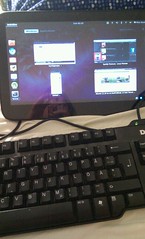I attended an event in the spring that ended with a miraculous incident of being given an ExoPC to use. The operating system that it came installed with was a bit painful to use (and I’m not talking about a Microsoft product), so I didn’t find too much use for the device. I flashed it with a new operating system image quite often, only to note that none to few problems were ever fixed in the UI. Since operating system project is pretty much dead now with participants moving to new areas and projects of interest, I decided to bite the bullet and flash my device with the newest Ubuntu.
Installation project requires an USB memory stick made into an installation media with the tools shipped with regular Ubuntu. A keyboard is also nice to have to make installation process feasible in the first place, or at least it makes it much less painful experience. After the system is installed, comes the pain of getting the hardware to play nice. Surprisingly I’ve had no other problems than trying to figure out how to make the device and operating system to realise that I want to scroll or right-click with my fingers instead of a mouse. Almost all the previous instructions I’ve come across involve (at best) Ubuntu 11.04 and a 2.6.x kernel – and the rest fail to give a detailed instruction on how to make the scrolling or right-clicking work with evdev. The whole process is very frustrating, and I still haven’t figured everything out.
Anyway. First thing you notice, especially without the fingerscrolling working, is that the new scrollbars are a royal pain in the hiney. The problem isn’t as bad in places where the problem can be bypassed, like in Chromium with the help of an extension called chromeTouch where the fingerscrolling can be set to work, or in Gnome-shell which actually has a decent sized scrollbar, or uninstalling overlay-scrollbar altogether, which isn’t pretty, but it works.
 The second immediate thing that slaps a cold wet towel on the face is – after you’ve unplugged the USB keyboard – is the virtual keyboards. Ubuntu and its default environment Unity use OnBoard as the default on-screen keyboard. OnBoard is a complete keyboard with (almost) all the keys a normal keyboard would have, but it lacks a few features that are needed on a tablet computer: it lacks automation of hiding and unhiding itself. In addition to this annoyance OnBoard had the tendency of swapping the keyboard layout to what I assume to be either US or British instead of the Finnish one I had set as default on the installation. One huge problem with OnBoard is at least in my use that it ends up being underneath the Unity interface, where it’s next to useless.
The second immediate thing that slaps a cold wet towel on the face is – after you’ve unplugged the USB keyboard – is the virtual keyboards. Ubuntu and its default environment Unity use OnBoard as the default on-screen keyboard. OnBoard is a complete keyboard with (almost) all the keys a normal keyboard would have, but it lacks a few features that are needed on a tablet computer: it lacks automation of hiding and unhiding itself. In addition to this annoyance OnBoard had the tendency of swapping the keyboard layout to what I assume to be either US or British instead of the Finnish one I had set as default on the installation. One huge problem with OnBoard is at least in my use that it ends up being underneath the Unity interface, where it’s next to useless.
I tried to install other virtual keyboards, like Maliit and Florence, but instructions and packages on Oneiric are lacking and anyway, I still don’t know how to change the virtual keyboard from OnBoard to something else. However, the virtual keyboard in a normal Gnome 3 session with Gnome-Shell seems to work more like the virtual keyboards should, but alas, it doesn’t seem to recognize the keyboard layout settings at all and thus I’m stuck to non-Finnish keyboard layout.
However among all these problems Ubuntu 11.10 manages to show great potential with both Unity and Gnome 3. Ubuntu messaging menu is nice, once gmnotify has been installed (as I use Chromium application Offline Gmail as my email client), empathy set up, music application of choice filled with music and browser settings synchronized.
I’ve found that the webcam works perfectly and the video call quality is much better than it has been earlier on my laptop where I’ve resorted into using GMails video call feature, because it Just Works. It’s nice to see that pulseaudio delivers and bluetooth audio works 100% with both empathy video calls and stereo music/video content.
Having read of the plans for future Ubuntu releases from blogposts of people who were attending UDS-P in Orlando this past week, I openly welcome our future tablet overlords. Ubuntu on tablets needs love and it’s nice to know it’s coming up. This all bodes well for my plan to take over the world with Ubuntu tablet, screen, emacs and chromium :-)